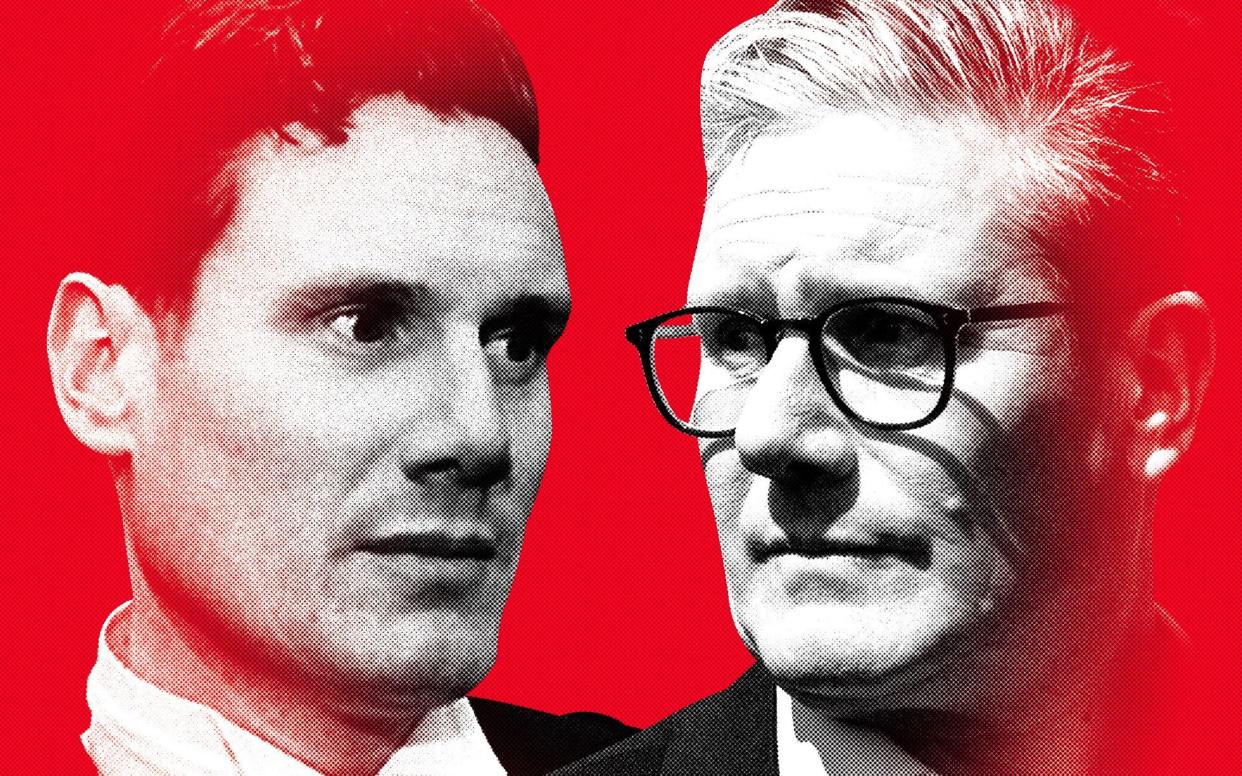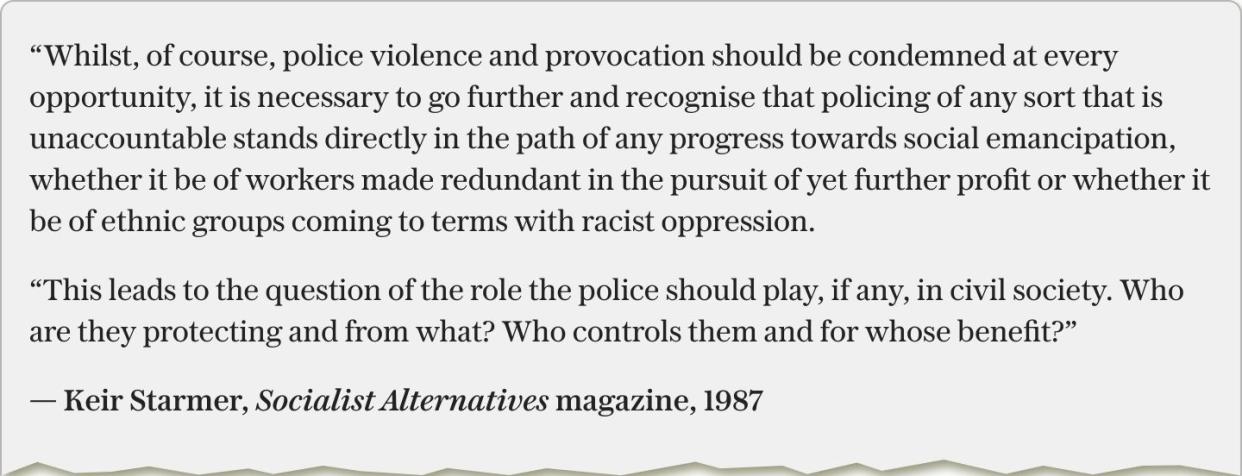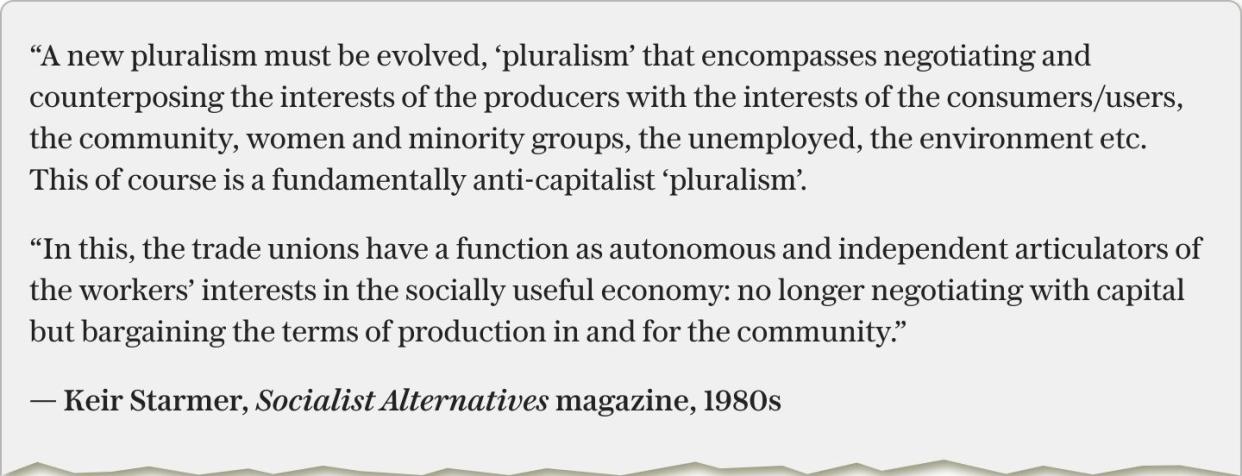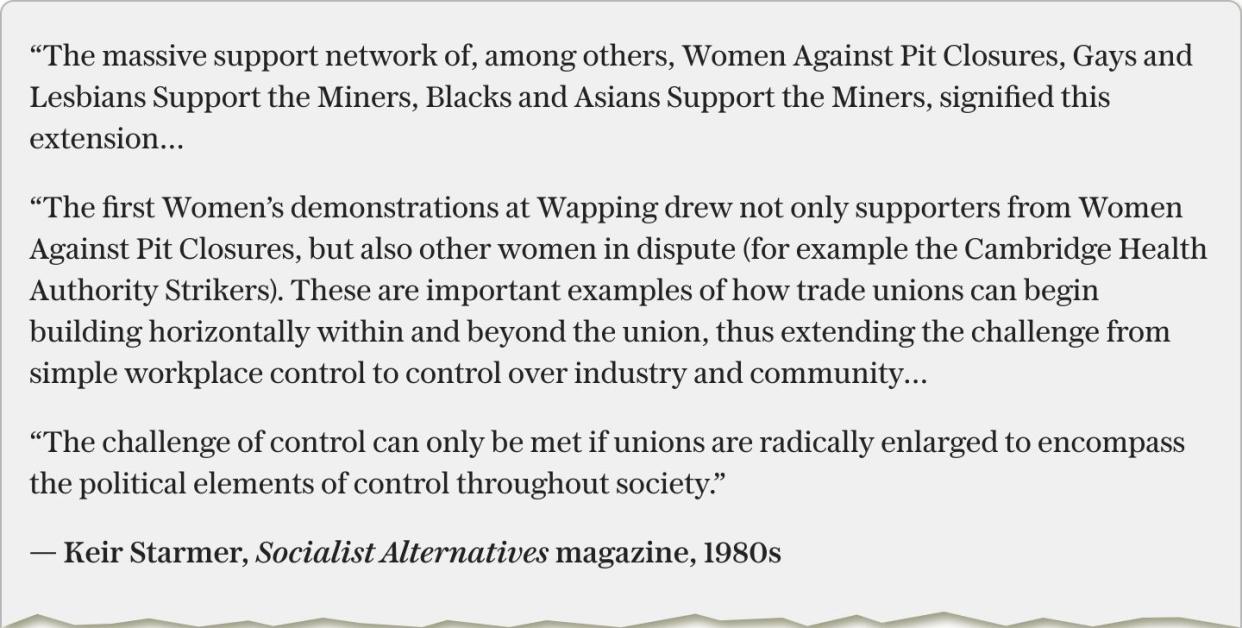Starmer’s history of Left-wing views revealed

Sir Keir Starmer, like Sir Tony Blair before him, has done his best to detoxify the Labour brand and convince voters there is nothing to fear in voting for him.
But where Sir Tony was a lifelong centrist, Sir Keir started his political life on the extreme left, and questions remain over the extent to which he has abandoned his Trotskyist beliefs.
When he was in his mid-20s, in the year he became a barrister, he wrote an article in a socialist fringe magazine musing on whether the police should have any role in civil society.
At a similar age he is reported to have said he did not believe in imprisonment “for anything, ever”. A Labour spokesman said there was “no proof” that Sir Keir said this, while stopping short of denying outright that he ever said it.
Just seven years ago he praised Jeremy Corbyn’s astonishingly Left-wing election manifesto as a “foundational document” for Labour, and when he was running for leadership in 2020 he promised to close immigration detention centres, having previously said there was a “racist” undercurrent to all immigration law.
A Labour spokesperson said: “Keir’s first step priorities for Britain are delivering economic stability, securing our borders, cutting NHS waiting times, setting up GB Energy, cracking down on antisocial behaviour and recruiting 6,500 more teachers.“
“After 14 years of Tory failure, working people have paid the price. All that the Conservatives have to offer is five more years of chaos and division. It’s time to turn a page with a Labour government.”
Here we examine what the prospective prime minister says now on key issues, and what he has said about them in the past.
Policing and prisons
What he says now:
Labour’s website says the party will “rebuild security on Britain’s streets, with a mission to halve serious violence and rebuild confidence in policing and the criminal justice system”.
“Labour has pledged to put 13,000 extra police and PCSOs on the beat to give every community a named officer they can get in touch with, so policing gets back to doing what it’s supposed to do.”
In May this year, Sir Keir criticised Rishi Sunak over his early release scheme for prisoners, saying he should “stop issuing get out of jail free cards to prisoners”.
What he said then:
In an article for the magazine Socialist Alternatives in 1987, when Sir Keir was 24, he wrote about the battles between the police and print workers on the picket lines at Rupert Murdoch’s printing plant at Wapping, east London, accusing the police of “paramilitary” methods.

In his late 20s, Sir Keir had such liberal beliefs on law and order that one friend, quoted by Lord Ashcroft in his biography Red Knight, recalled him saying he did not believe in imprisonment “for anything, ever”.
Personal taxation
What he says now:
Labour will not increase income tax, National Insurance or VAT (except on private school fees).
The party’s website also says it will “close the loopholes which allow some “non-dom” mega rich people who live in the UK to avoid paying tax.
“Labour will tax fairly…we will introduce a new fiscal lock, guaranteeing in law that any government making significant tax and spending changes will be subject to an independent forecast from the Office for Budget Responsibility.”
He has dismissed Tory claims that Labour will put up taxes by £2,000 per family as “garbage”.
What he said then:
When he campaigned for the Labour leadership in 2020 one of his pledges was to: “Increase income tax for the top 5 per cent of earners.”
He described this policy as nothing less than “economic justice”. According to the Office of National Statistics, the top 5 per cent in 2024 earn £87,012 per year.
In 2022, Sir Keir vowed to bring in a new tax band for those earning more than £150,000. Under the current system, tax is charged at 40 per cent on earnings above £50,270 and 45 per cent on earnings above £125,140.
Gordon Brown introduced a 50 per cent tax rate on earnings of more than £150,000, which came into effect weeks before the 2010 general election before being scrapped by Lord Cameron.
The economy
What he says now:
In July last year, Sir Keir wrote in The Observer: “Frankly, the Left has to start caring a lot more about growth, about creating wealth, attracting inward investment and kick-starting a spirit of enterprise. It is the only show in town for those who dream of a brighter future.”
Speaking to Tony Blair in 2023, Sir Keir said that “we need three things: growth, growth, growth”.
What he said then:
At his 2020 leadership campaign launch, Sir Keir said: “The idea that economic growth alone will solve society’s ills and make us all prosper is wrong and outdated.”
He argued that Labour should “rebuild our economic model in place of the failed free market one”.
In the July 1986 edition of Socialist Alternatives, Sir Keir criticised then Labour leader Neil Kinnock’s economic policy because it “presumably safeguards the freedom of capital in Britain whilst showing little regard for the freedom of the workforce and community to extend their political control”.
The magazine, which he helped to produce, argued the working week should be cut to 32 hours.
Business
What he says now:
In an interview with The Times last weekend Sir Keir said: “I think it’s a good thing that people are aspirational. When I say our number one mission is economic growth, you could say our number one mission is wealth creation.
Rachel Reeves said on an election visit to Rolls Royce: “The Labour Party is today the natural party of British business.”
On business taxation, Labour will impose a tax on oil and gas companies and will keep corporation tax at 25 per cent.
What he said then:
In an article for Socialist Alternatives, Sir Keir claimed that collective bargaining was not Left-wing enough because it gave too much power to employers.

Nationalisation
What he says now:
In July 2022, Rachel Reeves, the shadow chancellor, told the BBC’s Today programme that nationalising public services “just doesn’t stack up against our fiscal rules”, pointing out that such commitments in the 2019 election campaign “secured our worst results since 1935”.
On the same day, Sir Keir said: “I take a pragmatic approach rather than an ideological one, I agree with what Rachel Reeves said this morning.”
Last week, he fleshed out his plans for Great British Energy, revealing it would be an investment vehicle rather than an energy provider.
Labour has promised to renationalise nearly all passenger rail services within the next parliament.
What he said then:
When he ran for the Labour leadership, Sir Keir said “public services should be in public hands, not making profits for shareholders”, specifically mentioning “rail, mail, energy and water”. This was widely perceived as a commitment to nationalise those industries, a key plank of Jeremy Corbyn’s manifesto in 2017.
When he was interviewed for pupillage as a barrister at Doughty Street Chambers, Sir Keir is said to have repeated French anarchist Pierre-Joseph Proudhon’s adage that “all property is theft”.
Immigration and free movement
What he says now:
Labour’s website says it supports a points-based immigration system for legal migrants and will speed up the return of illegal migrants to safe countries.
It also says a Labour government will “prioritise strong border security and deliver a properly managed and controlled asylum system which returns people who have no right to be here”.
Sir Keir says he will ditch the Rwanda scheme but has refused to rule out offshore processing or sending asylum seekers abroad to have their claims processed.
What he said then:
In a 1988 edition of the magazine Socialist Lawyer, Sir Keir, who was 26 at the time and had been called to the Bar, said there is a “racist undercurrent which permeates all immigration law”.
Then, when he was running for the Labour leadership in 2020, he wrote to the Labour Campaign for Free Movement, saying he was “proud to have served as Jeremy [Corbyn’s] shadow immigration minister”, and boasting he had taken the last Labour government to court for cutting benefits for asylum seekers.
Complaining that the immigration system aims to “deter, not support” migrants coming to Britain illegally, he said he would close immigration detention centres, allow asylum seekers to work, liberalise family reunion rules, and give some foreigners the vote.
Ireland
What he says now:
A referendum on Irish unification is “not even on the horizon”, Sir Keir said before last October’s Labour Party conference.
He has previously said he would campaign for Northern Ireland to remain part of the UK if such a referendum were ever to be held.
What he said then:
In 1987, he became a member of the editorial committee of a magazine called Socialist Lawyer. It is the official journal of the Haldane Society of Socialist Lawyers. The Haldane Society had a clear policy at that time of supporting a united Ireland, saying: “We call for British withdrawal.”
A Labour Party spokesman said Sir Keir “never personally wrote in support of a united Ireland”.
After the Winchester Three – who had been convicted of plotting to kill Tom King, the Cabinet minister, in an IRA plot – had their convictions overturned on a technicality, Sir Keir wrote an article headlined “King Size Blunder” in which he highlighted the Haldane Society’s role in getting the convictions overturned.
Worker’s rights
What he says now:
According to the party’s website: “Labour is pro-worker and pro-business, and we will work in partnership with trade unions and business to deliver our New Deal.
“Rather than division and decline, Labour will offer people the hope that comes from a long-term plan, working with employers and workers to get Britain moving forward. From now until the General Election, we’ll show how our plans will be turned into a reality benefiting those who contribute to our economy.
“We will invite businesses, trade unions, and civil society to input on how we can best put our plans into practice.”
What he said then:
In his leadership campaign launch, Sir Keir was clear that: “We walk with the trade unions.”
In Socialist Alternatives in the 1980s, Sir Keir called for an enlargement of the unions, saying that in the 1984 miners’ strike:



